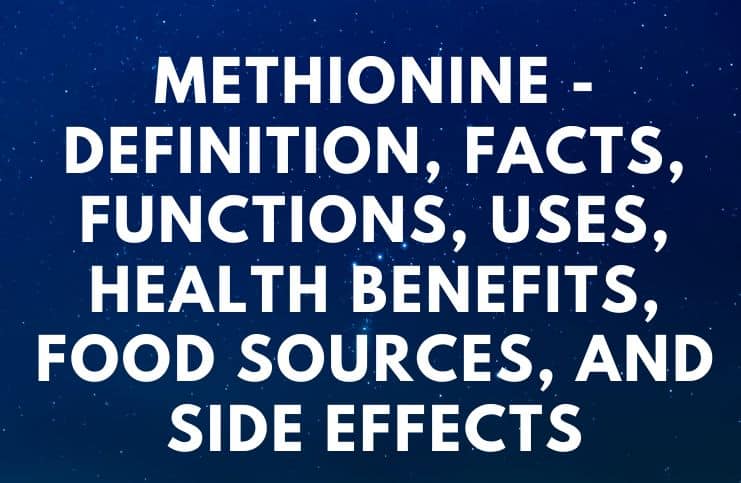Methionine – Definition, Facts, Functions, Uses, Health Benefits, Food Sources, And Side Effects:
Facts
It is an essential amino acid for hepatic, urinary, and cardiovascular protection.
Methionine is an essential amino acid because it can not be produced in the body, and thus, it can only be obtained exclusively by external intake. In microorganisms, methionine is synthesized from the amino acids aspartic acid and cysteine.
This amino acid is a precursor to the amino acids cysteine and cystine. It was first isolated by John Howard Mueller in 1921.
Health Benefits
- Hepatic protection: it reduces the accumulation of heavy metals; it lowers cholesterol and triglycerides levels; alongside choline and inositol, this essential amino acid reduces the accumulation and fat deposits in the liver due to the lipotropic effect; it converts estradiol into the nontoxic form called estriol (it protects the liver during the estrogen metabolism).
- Improving the energy metabolism of the muscle cell that stimulates the production of creatine.
- Digestive problems account for nearly 10 percent of all healthcare spending, and a least 70 million Americans suffer from some sort of digestive illness. this amino acid is important in gut health.
- From 2013- 2015, an estimated 54.4 million people in the United States have suffered from some form of arthritis. Consuming supplements with this amino acid improves the structure and mobility of joints.
- This amino acid provides the body with sulfur and other substances necessary for proper development. Sulfur is a very important element, whose lack leads to the body’s inability to produce certain antioxidants.
- It is vital for the transportation and absorption of zinc and selenium in the body. These two essential minerals act just like an antioxidant within the body, slowing the aging process and fighting free-radical damage.
- Cardiovascular disease accounts for nearly 801,000 deaths every year in the United States. That’s about 1 of every 3 deaths. This amino acid provides cardiovascular protection by reducing fat levels in the bloodstream and atheroma plaque formation.
- Higher levels of this amino acid in the daily diet are strongly connected with a lowering in pancreatic cancer risk.
- Urinary tract protection: it prevents adherence of bacteria to the bladder wall and their proliferation; it reduces the occurrence and formation of kidney stones.
- As many as 1 million people in the United States live with Parkinson’s disease, which is more than the combined number of patients diagnosed with muscular dystrophy, multiple sclerosis, and Lou Gehrig’s disease. According to research, consuming foods high in this amino acid helps in treating and reducing the symptoms of Parkinson’s disease.
- Maintaining the structure of hair, skin, and nails: it stimulates collagen production.
- In 2015, 39,513 individuals were diagnosed with HIV infection in the US. This amino acid may help in HIV/AIDS treatments.
Deficiency
Some individuals with a deficiency in this amino acid may experience the following symptoms – problems with skin integrity, coordination and muscle strength, and detoxification of the liver.
Dosage
An adult should intake approximately 19 mg of this amino acid/ kilo of body weight every day.
However, special circumstances and conditions may lead to a much higher requirement.
Food Sources
Large amounts of this amino acid can be found in: eggs, sesame, meat, wheat, wheat bran, oats, oat bran, millet, hazelnuts, pecans, peanuts, almonds, pumpkin seeds, chia seeds, sesame seeds, flax seeds, pine seeds, watermelon seeds, sunflower seeds vegetables, fruits (apples, mangoes, papayas, pineapples) and legumes (peas, red kidney beans, navy beans, adzuki beans, mung beans, lentils, soybeans, chickpeas).
Side Effects of Methionine
High consumption of this amino acid is not recommended due to its serious side effects. There are not sufficient studies regarding the use of these types of supplements if you are pregnant or breastfeeding, therefore, it is recommended to avoid them.
In addition, if you have severe liver disease, do not ingest supplements containing this amino acid.
Therefore, try not to consume supplements containing this amino acid and to obtain it only from food.
READ THIS NEXT:
Threonine – Side Effects and Health Benefits
Essential & Nonessential Amino Acids – Facts, Uses, Functions
Histidine – Side Effects and Health Benefits
Tryptophan – Side Effects & Health Benefits
References https://www.britannica.com/science/methionine https://pubchem.ncbi.nlm.nih.gov/compound/Methionine
